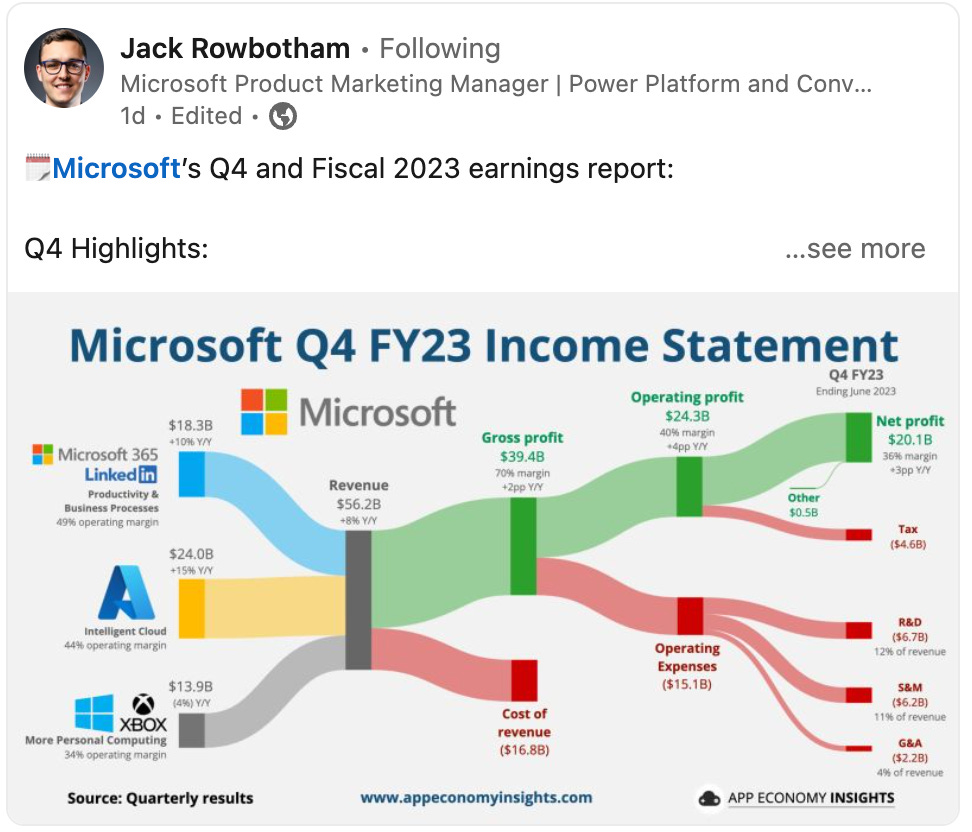Hey friends,
In this edition, I will talk about:
my week on the seaside
the Solopreneurship hype
the PARA framework
3 posts I liked
the areas you should focus on as an aspiring Project Manager
1/ Working from the seaside




I am lucky enough to have a job that gives me the flexibility to work remotely a few days a week and even whole weeks from time to time. I am not one of those people who are sure that full-remote is the answer, as you can build stronger relationships with your colleagues if you spend physical time with them, even if not every day.
So, to escape the heat wave in Bucharest, my wife and I came to the seaside this week, and we’ve been working from here.
From one perspective, it’s not very pleasant to see all those people on the street going to the beach while you know you have a few more hours until you finish your day.
On the other hand, it’s great to start your day with a run on the shoreline and to sit on the sand for a couple of hours in the evenings.
And I often think about how lucky we are to be living in these times and especially to have the type of jobs that permit us to do our jobs from anywhere in the world.
This was unimaginable 50 years ago. What am I saying? “Working from home” was taboo even in the software industry before the pandemic.
I remember we only had one day per week for a year or so before the pandemic.
But one of the benefits of COVID (probably the only one) is that a lot of people have realized that someone can be at least as productive when he or she is working outside the office.
Personally, I can concentrate a lot better when I’m at home, and I keep those days for strategizing, coming up with ideas, and deep thinking. I “use” the days I’m in the office to communicate with people and solve things that are easier to solve in person.
I have a very big problem with heat and will often lose sleep when the room is not cool. The temperatures here at the seaside were perfect; I slept at least 7.5 hours every night, and this gave me a lot of energy for the days to come.
So, overall, I’m confident I had increased productivity for this workweek than I would have had if I stayed in Bucharest.
Next week we’re back, though, and I hope it will be for a temperature less than 41 °C.
2/ The “Solopreneurship” hype
If you haven’t heard this word yet, you’re not spending too much time on Twitter (or is it called X now?)
If I remember correctly, the term was coined by Justin Welsh, who is one of my favorite content creators.
Justin is a former startup executive who burned out and decided he didn’t want to work in corporate America anymore.
So he quit his job and started writing online, initially on LinkedIn and later on Twitter too. He wrote about his experience scaling startups and started coaching founders.
He built a big following, and as people started asking him how he'd done that, he pivoted to writing about how you can escape the 9-5 and become a solopreneur.
Simply put, a solopreneur is a person who sets up a business, of which they are the sole employee.
A solopreneur is both the owner and the workforce of their business. They are responsible for organizing, managing, and assuming the risks of their enterprise, without the help of a partner.
Solopreneurs don’t want to scale, they want to have the flexibility to spend more time with their families and their passions without the stress and rigidity of a job.
Justin often writes about how he goes on mid-day hikes with his wife and often finishes his workday by 4 AM.
And I can agree with him that this is the life to live.
What I don’t agree with is that it’s the only way you can live the life of your dreams.
I believe that it’s easier to get to a similar life by working for a company.
Why do I say this? Mainly in terms of odds. There are a lot more chances to get a good job at a big company. You need to work hard on the things that are important for that company.
But eventually, you will get into a position that you like, with a flexible schedule and enough money to live a comfortable life.
Is it easy? No.
Can you do this by being a freelancer? Yes. Is it easier? Absolutely NOT.
If you work for a company, you can leverage the internal structures and procedures already in place. That’s why people in a company are often specialized:
financial analysts
project managers
salespeople
Are all different functions in a company.
If you’re a solopreneur, you need to be in all these positions.
If you have a development background, you will need to learn Marketing. You will need to learn Sales. You will need to learn Accounting.
You will need to put yourself out there. If you don’t create good content, you won’t build an audience. You don’t have an audience, and you can’t sell to that audience.
You don’t sell, you don’t eat. It’s as simple as that.
And again, I’m not saying this is not possible. What I’m really saying is that it’s harder than it looks.
And even though 95% of people on Social Media dream about building a business and being their own bosses, the reality is that less than 1% of the people in the world really end up in this position.
And it’s not that bad. I would argue that most people who are good at their jobs and have the courage to take on challenges are living a very good life.
Not to mention the different benefits like health insurance and pension plans.
So, before you take a strong position about being employed:
“I want to be my own boss.”
just take into consideration that a solopreneur has hundreds of bosses.
They’re called customers, and you need to please all of them.
3/ The PARA framework
I started being a lot more organized once I found out about the PARA framework from Tiago Forte. I don’t remember when that happened, but it was a few years ago.
I also wanted to join his “Building A Second Brain” cohort but just thought it was too expensive.
I watched almost all of his YouTube videos and read his book last year, so I think I have it all figured out.
PARA stands for Projects, Areas, Resources and Archive.
It’s a methodology to divide all your notes and tasks into these categories. From most actionable to least actionable.
Projects are things that are in your focus at the moment and have a clear set of actions and a deadline.
Eg: Summer vacation; Taxes 2023; Get a new job; etc
Areas are responsibilities that you have every day in domains that are important to you and will probably not end at some point.
Eg: Health & Fitness; Family & Friends; Home; Car; etc
Resources are similar to areas, but it’s not something in your focus at the moment.
Eg: Learning to play the guitar; Travel Destinations; Movies to watch; etc.
The archive is composed mainly of everything you used at some point but no longer need.
But I cannot explain nearly as much as Tiago can in this series of videos that are prefacing his new workbook on implementing PARA in your life:
Only 2 pieces are up, but subscribe to his channel, and you’ll get the following ones soon (I hope).
I use PARA on all my devices, and it brings me a lot of clarity, so you should give it a try too.
4/ Posts I liked
3 tweets or LinkedIn posts that made me think, educated me, or amused me over the last week.
This great graphic about Microsoft’s earnings and profit over the last quarter
Why do some people behave so badly when they leave a job?
Software Managers will know this:
5/ My own favorite piece of content
In this Twitter thread, I discuss the most important areas a future Project Manager should focus on:
In 2007, I was a manual tester with no perspective for the future.
Since 2015, I have led several multimillion-dollar projects.
Because I transitioned to a Project Manager position.
If you want to become one and don't know where to start, focus on these 7 areas:
1. Communication
90% of a PM's job is communicating, one way or another.
email
reports
presentations
You must bridge the gap between technical teams, stakeholders, and clients.
Start with active listening and read your way through this complex topic.
2. Stakeholder management
You can survive only if you please your most important stakeholders.
be transparent
understand their needs
manage their expectations
Build your relationships from the first day on the job.
3. Risk-management
There is one way a project can be successful.
But it can fail for a thousand reasons.
The best managers will:
identify potential issues
devise contingency plans
implement mitigation strategies
Handle risks, or they'll ruin your project.
4. Problem-solving
You're put in that position to come up with solutions, not additional problems.
analyze case studies
engage in group exercises
seek mentorship from experienced PMs
Implement creative solutions, and they'll love you for it.
5. Time management
Often underrated, time management and productivity are crucial competencies for a PM.
How can you manage others if you can't even manage yourself?
Time-blocking
Eisenhower matrix
Pomodoro technique
Should be tools in your arsenal.
6. Leadership
A project manager must inspire and guide her team.
nurture a positive culture
provide encouragement
motivate your team
Contrary to popular belief, this is not something you're born with.
But the good news is that it's a perfectly learnable skill.
7. Agile methodologies
90% of current software projects are done in an Agile framework.
As an aspiring PM, you must cultivate a mindset that embraces change.
Focus on:
adaptability
iterative development
customer collaboration
If you want to improve your results.
Thank you for reading, and let me know if you liked something in particular in this newsletter.
Until next time,
Leo
P.S.: If you would like to read my content on a daily basis, don’t forget to follow me on Twitter and Linkedin.
P.S. 2: If you want to take your Productivity to the next level, check out my extensive Productivity course that can accelerate your career.






